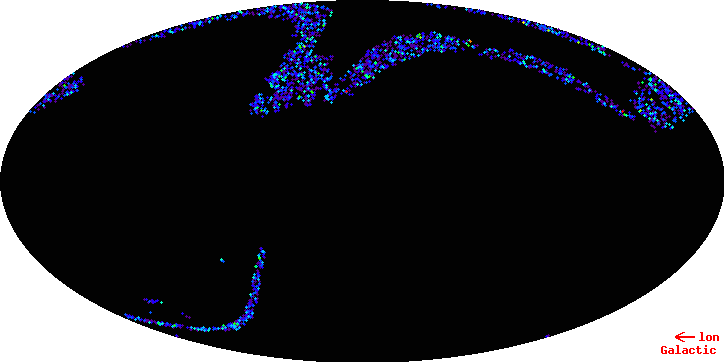Narrow absorption lines with two observations from the Sloan Digital Sky Survey. (2015)
Keywords :
catalogues - surveys - quasars absorption lines - quasars: general
Abstract:We assemble 3524 quasars from the Sloan Digital Sky Survey (SDSS) with repeated observations to search for variations of the narrow C IV {lambda}{lambda}1548, 1551 and Mg II {lambda}{lambda}2796, 2803 absorption doublets in spectral regions shortward of 7000{AA} in the observed frame, which corresponds to time-scales of about 150-2643d in the quasar rest frame. In these quasar spectra, we detect 3580 CIV absorption systems with z_abs_=1.5188-3.5212 and 1809 MgII absorption systems with z_abs_=0.3948-1.7167. In term of the absorber velocity ({beta}) distribution in the quasar rest frame, we find a substantial number of CIV absorbers with {beta}<0.06, which might be connected to absorption of quasar outflows. The outflow absorption peaks at
...(more)
The Baryon Oscillation Spectroscopic Survey (BOSS: Eisenstein et al.
2011AJ....142...72E; Paris et al. 2012, Cat. VII/269) is the main
dark-time legacy survey of the third stage of the SDSS, which used the
same 2.5-m telescope (Gunn et al. 2006AJ....131.2332G; Ross et al. 2012,
J/ApJS/199/3) as the first and second stages of the SDSS (hereafter
SDSS-I/II). SDSS-I/II spectra have a wavelength coverage from 3800-9200{AA}
with a spectral resolution of 1800-2200 (e.g. York et al.
2000AJ....120.1579Y). BOSS spectra span a range from 3600-10500{AA} at
a resolution of 1300-2500 (Paris et al. 2012, Cat. VII/269). During the
first two years, BOSS detected 87822 quasars over an area of 3275 deg^2^,
including 7932 quasars that were observed by SDSS-I/II as well. Quasars
observed by both SDSS-I/II and BOSS provide a remarkable chance to study
the variabilities of absorption lines in a large population.
Throughout this work, we take the quasar emission redshifts provided
by Hewett & Wild (2010, J/MNRAS/405/2302,
http://das.sdss.org/va/Hewett_Wild_dr7qso_newz/) directly.
- VII/269 : SDSS Quasar Catalog, DR9Q (Paris+, 2012)
- VII/279 : SDSS quasar catalog
- J/ApJ/613/129 : Equivalent widths of QSOs (Wise+, 2004)
- J/MNRAS/405/2302 : Improved redshifts for SDSS quasar spectra (Hewett+, 2010)
- J/ApJS/199/3 : The quasars MMT-BOSS pilot survey (Ross+, 2012)
- J/MNRAS/434/163 : QSOs narrow absorption line variability (Hacker+, 2013)
- J/ApJS/210/7 : BOSS narrow CIV absorption lines. I. zem<=2.4 (Chen+, 2014)
- J/ApJS/215/12 : BOSS narrow CIV absorption lines. II. zem>2.4 (Chen+, 2014)






